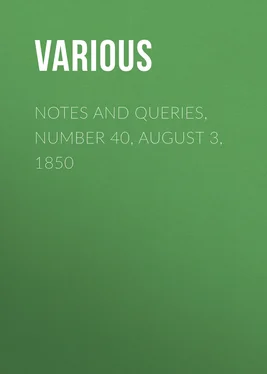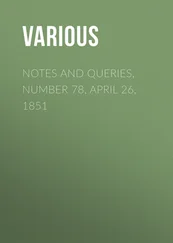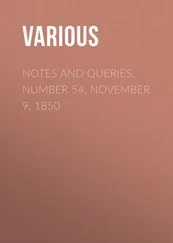Various - Notes and Queries, Number 40, August 3, 1850
Здесь есть возможность читать онлайн «Various - Notes and Queries, Number 40, August 3, 1850» — ознакомительный отрывок электронной книги совершенно бесплатно, а после прочтения отрывка купить полную версию. В некоторых случаях можно слушать аудио, скачать через торрент в формате fb2 и присутствует краткое содержание. Жанр: foreign_antique, periodic, foreign_edu, на английском языке. Описание произведения, (предисловие) а так же отзывы посетителей доступны на портале библиотеки ЛибКат.
- Название:Notes and Queries, Number 40, August 3, 1850
- Автор:
- Жанр:
- Год:неизвестен
- ISBN:нет данных
- Рейтинг книги:4 / 5. Голосов: 1
-
Избранное:Добавить в избранное
- Отзывы:
-
Ваша оценка:
- 80
- 1
- 2
- 3
- 4
- 5
Notes and Queries, Number 40, August 3, 1850: краткое содержание, описание и аннотация
Предлагаем к чтению аннотацию, описание, краткое содержание или предисловие (зависит от того, что написал сам автор книги «Notes and Queries, Number 40, August 3, 1850»). Если вы не нашли необходимую информацию о книге — напишите в комментариях, мы постараемся отыскать её.
Notes and Queries, Number 40, August 3, 1850 — читать онлайн ознакомительный отрывок
Ниже представлен текст книги, разбитый по страницам. Система сохранения места последней прочитанной страницы, позволяет с удобством читать онлайн бесплатно книгу «Notes and Queries, Number 40, August 3, 1850», без необходимости каждый раз заново искать на чём Вы остановились. Поставьте закладку, и сможете в любой момент перейти на страницу, на которой закончили чтение.
Интервал:
Закладка:
Various
Notes and Queries, Number 40, August 3, 1850
NOTES
TRANSLATIONS OF JUVENAL—WORDSWORTH
Mr. Markland's ascertainment (Vol. i., p. 481.) of the origin of Johnson's "From China to Peru," where, however, I sincerely believe our great moralist intended not so much to borrow the phrase as to profit by its temporary notoriety and popularity, reminds me of a conversation, many years since, with the late William Wordsworth, at which I happened to be present, and which now derives an additional interest from the circumstance of his recent decease.
Some mention had been made of the opening lines of the tenth satire of Juvenal:
"Omnibus in terris, quae sunt a Gadibus usque
Auroram, et Gangem pauci dignoscere possunt
Vera bona, atque illis multum diversa, remotâ
Erroris nebulâ."
"Johnson's translation of this," said Wordsworth, "is extremely bad:
"'Let Observation, with extensive view,
Survey mankind from China to Peru.'
"And I do not know that Gifford's is at all better:
"'In every clime, from Ganges' distant stream,
To Gades, gilded by the western beam,
Few, from the clouds of mental error free,
In its true light, or good or evil see.'
"But", he added, musing, "what is Dryden's? Ha! I have it:
"' Look round the habitable world , how few
Know their own good, or, knowing it, pursue.'
"This is indeed the language of a poet; it is better than the original."
The great majority of your readers will without doubt, consider this compliment to Dryden well and justly bestowed, and his version, besides having the merit of classical expression, to be at once concise and poetical. And pity it is that one who could form so true an estimate of the excellences of other writers, and whose own powers, it will be acknowledged, were of a very high order, should so often have given us reason to regret his puerilities and absurdities. This language, perhaps, will sound like treason to many; but permit me to give an instance in which the late poet-laureate seems to have admitted (which he did not often do) that he was wrong.
In the first edition of the poem of Peter Bell (the genuine, and not the pseudo-Peter), London, 8vo. 1819, that personage sets to work to bang the poor ass, the result of which is this, p. 36.:
"Among the rocks and winding crags—
Among the mountains far away—
Once more the ass did lengthen out
More ruefully an endless shout,
The long dry see-saw of his horrible bray."
After remarks on Peter's strange state of mind when saluted by this horrible music, and describing him as preparing to seize the ass by the neck, we are told his purpose was interrupted by something he just then saw in the water, which afterwards proves to be a corpse. The reader is, however, first excited and disposed to expect something horrible by the following startling conjectures:—
"Is it the moon's distorted face?
The ghost-like image of a cloud?
Is it a gallows these pourtrayed?
Is Peter of himself afraid?
Is it a coffin—or a shroud?
"A grisly idol hewn in stone?
Or imp from witch's lap let fall?
Or a gay ring of shining fairies,
Such as pursue their brisk vagaries
In sylvan bower or haunted hall?
"Is it a fiend that to a stake
Of fire his desperate self is tethering?
Or stubborn spirit doomed to yell
In solitary ward or cell,
Ten thousand miles from all his brethren."
"Is it a party in a parlour?
Cramm'd just as they on earth revere cramm'd—
Some sipping punch, some sipping tea,
But, as you by their faces see,
All silent and all damn'd!
"A throbbing pulse the gazer hath," &c.
This last stanza was omitted in subsequent editions. Indeed, it is not very easy to imagine what it could possibly mean, or how any stretch of imagination could connect it with the appearance presented by a body in the water.
To return, however, from this digression to the subject of translations. In the passage already quoted, the reader has been presented with a proof how well Dryden could compress the words, without losing the sense, of his author. In the following, he has done precisely the reverse.
"Lectus erat Codro Procula minor."— Juv. Sat. iii. 203.
"Codrus had but one bed, so short to boot,
That his short wife's short legs hung dangling out!"
In the year 1801 there was published at Oxford, in 12mo., a translation of the satires of Juvenal in verse, by Mr. William Rhodes, A.M., superior Bedell of Arts in that University, which he describes in his title-page as "nec verbum verbo." There are some prefatory remarks prefixed to the third satire in which he says:
"The reader, I hope, will neither contrast the following, nor the tenth satire, with the excellent imitation of a mighty genius; though similar, they are upon a different plan. I have not adhered rigidly to my author, compared with him; and if that were not the case, I am very sensible how little they are calculated to undergo so fiery an ordeal."
And speaking particularly of the third satire, he adds:
"This part has been altered, as already mentioned, to render it more applicable to London: nothing is to be looked for in it but the ill-humour of the emigrant."
The reader will perhaps recollect, that in the opening of the third satire, Juvenal represents himself about to take leave of his friends Umbritius, who is quitting Rome for Canæ: they meet on the road (the Via Appia), and turning aside, for greater freedom of conversation, into the Vallis Egeriæ, the sight of the fountain there, newly decorated with foreign marbles, leads to an expression of regret that it was no longer suffered to remain in the simplicity of the times of Numa:
"In valem Egeriæ descendimus, et speluncas
Dissimiles veris. Quanto præstantius esset
Numen aquæ, viridi si margine clauderet undas
Herba, nec ingenuum violarent marmora tophum?"
In imitating this passage, Mr. Rhodes, finding no fons Egeriæ, no Numa, and perhaps no Muses in London, transfers his regrets from a rivulet to a navigable stream; and makes the whole ridiculous, by suggesting that the Thames would look infinitely better if it flowed through grass, as every ordinary brook would do.
"Next he departed to the river side,
Crowded with buildings, tow'ring in their pride.
How much, much better would this river look,
Flowing 'twixt grass, like every other brook,
If native sand its tedious course beguil'd,
Nor any foreign ornament defil'd."
DEDICATION TO MILTON BY ANTONIO MALATESTI
Dr. Todd, in his Life of Milton , ed. 1826, mentions the accidental discovery of a manuscript by Antonio Malatesti, bearing the following title:
"La Tina Equivoci Rusticali di Antonio Malatesti, c[=o]posti nella sua Villa di Taiano il Settembre dell' Anno 1637. Sonetti Cinqu[=a]nta. Dedicati al' III'mo Signore et Padrone Oss'mo Signor Giovanni Milton, Nobil' Inghilese."
It seems that this MS. had been presented, together with Milton's works, to the Academy della Crusca, by Mr. Brand Hollis, but had by some chance again found its way to England, and was sold by auction at Evans's some short time before Mr. Todd published this second edition of Milton's Life.
I know not if there has been any further notice of this MS., which is interesting as a monument of the respect and attention our great poet received from the most distinguished literary men of Italy at the time of his visit, and I should be glad if any of your correspondents can indicate its existence, and the place where it is now preserved. When it was on sale, I had permission to copy the title and a few of the sonnets, which were such as we could not imagine would have given pleasure to the chaste mind of Milton; each of them containing, as the title indicates, an équivoque , which would bear an obscene sense, yet very ingeniously wrapped up. The first sonnet opens thus:—
Читать дальшеИнтервал:
Закладка:
Похожие книги на «Notes and Queries, Number 40, August 3, 1850»
Представляем Вашему вниманию похожие книги на «Notes and Queries, Number 40, August 3, 1850» списком для выбора. Мы отобрали схожую по названию и смыслу литературу в надежде предоставить читателям больше вариантов отыскать новые, интересные, ещё непрочитанные произведения.
Обсуждение, отзывы о книге «Notes and Queries, Number 40, August 3, 1850» и просто собственные мнения читателей. Оставьте ваши комментарии, напишите, что Вы думаете о произведении, его смысле или главных героях. Укажите что конкретно понравилось, а что нет, и почему Вы так считаете.












